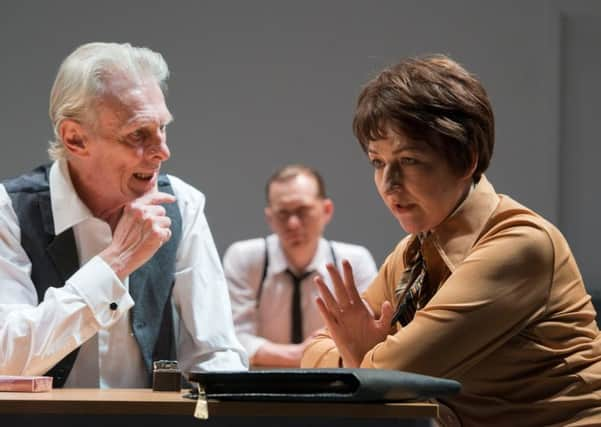Theatre review: Into That Darkness, Glasgow Citizens’ Theatre


Into That Darkness
Citizens’ Theatre, Glasgow
Rating: * * * * *
There’s no visible attempt to evoke the ultimate horror that lies behind the conversation we are about to witness, over two and a half hours; just a plain glass box containing a simple, bare prison interview room, with a high window, a table, a few chairs, a shelf to one side with old-fashioned tape-machines. And it’s in this plain, almost businesslike space – representing a room in a Düsseldorf prison in the year 1971 – that the Citizens’ Company, magnificently led by Blythe Duff as the journalist Gitta Sereny, and Cliff Burnett as her interviewee Franz Stangl, begin to unfold what has become perhaps the key story of modern European civilisation.
The facts of the story are familiar enough, of course; Stangl was camp commandant at Treblinka, where it is thought that almost a million Jewish prisoners died – herded in, stripped, robbed, forced to run naked into the gas chambers, and then incinerated – in 18 months between 1942 and late 1943. What’s striking about Robert David MacDonald’s superb 1994 dramatisation of Sereny’s book, though, is both the sheer dramatic intensity of this supreme interviewer’s forensic attempt to get beneath Stangl’s suave and controlled facade, and just how impenetrable, dark and mysterious his motives and feelings finally remain.
Advertisement
Hide AdFor, like many leading Nazis, Stangl was no gloating disciple of evil, revelling in his power to ignore normal rules; he thought of himself as a good man, an ace administrator, and a stickler for correct procedure and proper conduct. In Gareth Nicholls’s superb production, all of this is magnificently captured in Cliff Burnett’s tidy, punctilious, yet gradually fraying performance as Stangl; Blythe Duff is beyond praise as the journalist, often rigid with shock at what she finds or fails to find, but professional to the last. Molly Innes and Ali Craig offer flawless support as Stangl’s wife Thea, and other characters. And in the end, what do we learn? That under strong enough peer pressure, most human beings will do, and will excuse, almost anything. They will go into that darkness, even if they find – like Stangl, who died the day after the end of his conversation with Sereny – that some part of them can never return. And as the lights finally sweep up to show us our own reflections in the walls of the interview room, we also know that this judgment, and this warning, still applies to us, as much as it did to the people of Germany, three long generations ago.
JOYCE MCMILLAN
Until 30 May